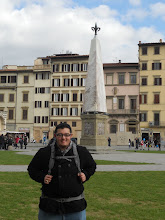So I know it has been a while since I've written, but keeping up with all of my classes and blogospheria Anglicana (I believe is how Scott Gunn says it) I haven't had much time for blogging of my own.
One of the classes I am taking this semester is Introduction to Environmental Issues. In this class we read a chapter of "The Healing Wisdom of Africa". The chapter we read was titled "The Healing Power of Nature". The book is about the experiences of a man named Some and his life having been educated in French schools, but being a member of the Dargara Tribe in Africa. Within chapter two Some speaks of Nature and Community.
"Community is about communion, about serving, about being intimately connected. The intimate connections one has in a community cloak he individual with love and acceptance, making that individual feel extremely at home. Home here does not mean some territorial construction, a mere roof over one's head. It is, rather, the place you belong."
This is a lesson our Anglican Communion, TEC, our diocese, and our parishes need to learn. Even on the simplest level of our church structure I hear so many stories of people not being welcomed for one reason or another. People go to churches in search for God, and they find no connection. They are not served; they are not cloaked in love and acceptance, but rather treated as outsiders and turned away.
How many times have you seen someone in your church sitting alone? Or at coffee hour seen someone standing in the corner? Instead of saying to your friends, "Who is that and why are they in our church." Invite them to sit and worship with you and share a cup of coffee and get to know who they are.
When going to a church for the first time I always rate the church based on the "coffee hour test." After worship - which is generally good - I go to coffee hour and see if people come over and talk to me. If only the priest comes up to me or someone I already know I decide that they have failed the test. They have not opened themselves up as a community to receive new people whether they be there for a week, a month, a year, or a lifetime. If people come over to me, try to get to know me, and sincerely care about what I have to say then they pass. These congregations are places of growth, of warmth, and of love.
With the knowledge of Episcopal Churches that I have, I think it is safe to say that your church is trying to grow. To bring more people into the church and closer to God. But, would your church pass the coffee hour test?
Next time someone new is at the church go over and sit with them. Welcome them into the community and cloak them in a blanket of love and acceptance. Because for all you know that person may be in search for a home, and what better place to make a home than a church, a Christian community, a place centered around God's love and acceptance.
Doing the dishes so we can spread the Gospel
1 year ago

Dee,
ReplyDeleteGreat post! You're right. Lots of churches think they are very welcoming, but it's only true for those who already know each other. The real test is just what you say: the coffee hour.
Your last paragraph is spot on. Studies tell us that most of those who visit a church for the first time are in transition -- recent death of a loved one, new home, divorce, new child, new relationship, loss of a job, new job, etc. People are vulnerable and open. When it goes well, it feels like a very holy time. When it doesn't go well, the church can do great harm. Great harm, just by not saying "hello." So, yes, the welcome really matters.
Oh, and I spell it "blogospheria Anglicana" and I'm honored you've picked up the phrase!
Pax,
Scott+